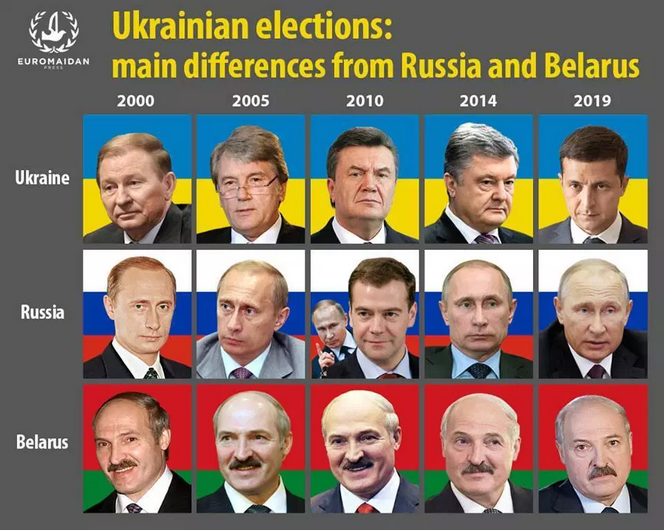In Ukraine (where orthodox Easter comes one week later for many), Easter Sunday was first and foremost the day of the second round of presidential elections. Elections in which comedian, tv producer and actor Volodymyr Zelenskiy gained almost three times as many votes as incumbent president Poroshenko. What does this mean for democracy and perspectives for peace?
Democracy
The next morning, I congratulated my Ukrainian friends with the fact that Ukraine was now more like the USA than like neighbouring Russia. That sounded like a joke but it wasn’t really. One can of course wonder to what extent it is a good idea to elect an actor with no political experience and quite a number of populist statements to head a country at war with the largest military power on the European continent. But the mere fact that someone with no political background, and who one year ago was not part of the political elite or the political system altogether, can be elected president is in itself worth celebrating – and something that activists in neighbouring Russia or Belarus can only dream of. Ukrainians have elected their 5th president in 6 elections since independence, and successfully protested falsified elections in 2004 and a too brusque foreign policy switch in 2014. Ukraine is, at the national level, a functioning democracy which allows for changes, corrections, and different viewpoints.

Mingling and polarisation
There were more parallels with US elections. Attempts from Moscow-controlled media outlets and actors to influence the outcome in favour of the most unpredictable candidate, for example. I do not think this came as a surprise to anyone, after five years of hybrid warfare that produced a continuous stream of narratives discrediting the Ukrainian state and its institutions.
And then there were the reactions by Ukrainians on social media after the results came out, that reminded me of what happened in the US when Trump was elected: hate, disdain, massive dismissal, also by the cultural and intellectual elites, of those who voted for the “populist” as “idiots” (or worse): the division of society into two camps (again…). But pretty soon I also started to see other messages, that called for understanding of the motives of those who voted differently, that called on people not to let themselves be divided, to continue building the country together, regardless of what president would be in office, that acknowledged strong emotions and reached out with a vision of a common future. This doesn’t mean the polarisation is gone. It is still out there, and real, and can have consequences. But it is not the only sound to be heard.
Other initiatives
And then there were those capable of seeing through the election results (¼ for Poroshenko, ¾ for Zelenskiy) to what this really means in terms of looking at the whole population (not everybody was able to vote, not all who were able to did vote), taking into account that more than one third of voters actually had preferred not to support any of the two candidates in the second round – almost as many as voted for Zelenskiy. This helps to not divide society into two camps of ‘good’ and ‘evil’.
And there were other things going on. People gathered in a spontaneous initiative to go to the presidential administration and say “thank you” to outgoing president Poroshenko. Poroshenko congratulated Zelenskiy and proposed his advice as needed. As did ousted president Yanukovych, who intends to return from Russia…
What’s next?
So what does this mean for the war, for peace, and relations with Russia? The truth is that nobody knows, yet. Zelenskiy is Russian-speaking – and a law declaring Ukrainian the official language to be used in public outings has just passed Parliament, within a week after his election. He has openly and actively supported the army over the past years, and declared to be open for negotiations with Russia to end the conflict, while Russian president Putin just edited a decree stating Russia will provide passports to people living in the non-government controlled areas in the east of Ukraine. Or to any Ukrainian who would want to take it. Zelenskiy responded on social media.
Internal vs external agenda
Arguably, the election results are more Poroshenko’s defeat than Zelenskiy’s victory, as people were disappointed with the results of the reform processes and the fight against corruption. One could say that good governance, as an internal problem, is a higher priority for many Ukrainians at the moment than the war, and that people were choosing, in their eyes, the lesser of two evils. Overcoming the utterly corrupt, post-soviet ‘clan’ system that has dominated Ukraine since independence will most likely take a few more presidents. But each new one is an attempt to step away from the old system, and, maybe more importantly, with each new one I notice less idle hope that a president will fix it all, and a growing consciousness that how the country develops will depend in the first place on what action people themselves will take. We don’t know what’s coming, and the future of Ukrainian-Russian relations is utterly uncertain – but there are reasons to have hope.




